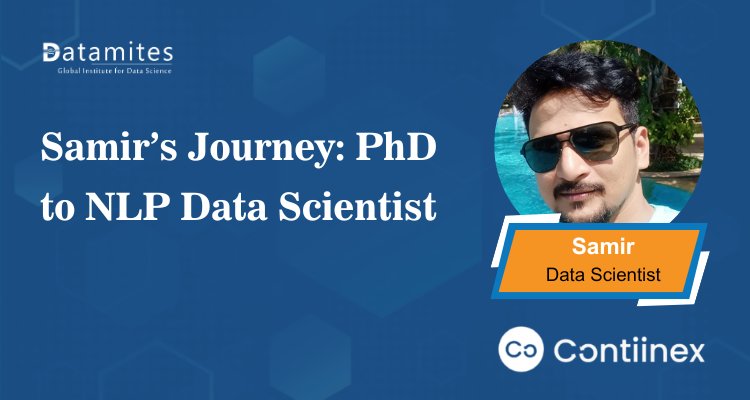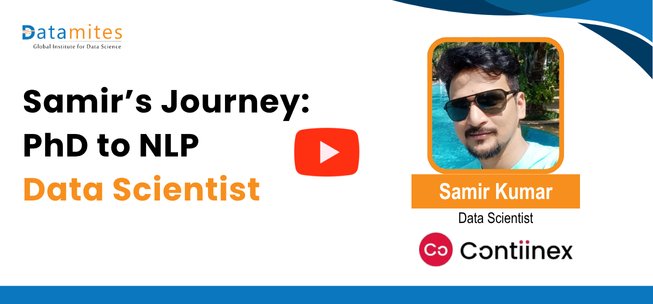From PhD to NLP Data Scientist: Samir’s Career Reinvention Journey
From PhD to NLP Data Scientist: Samir’s Career Reinvention Journey tells the inspiring story of Samir, an academic with a PhD who transitioned successfully into the dynamic field of Natural Language Processing (NLP).

Have you ever thought about how a strong foundation in mechanical engineering can open doors to an exciting career in data science? Transitioning from the world of academia to the dynamic, fast-evolving field of data-driven decision making is rarely a simple path but it’s packed with opportunities for those ready to take the leap. In this special edition of Datamites Alumni Talk, we explore the remarkable story of Samir, who transformed his love for language and data into a successful career as a data scientist.
Samir Kumar’s Q&A: A Career Switcher’s Guide to Inspiration
In this insightful Q&A, Samir Kumar shares his personal journey of transitioning into a new field and offers practical advice to inspire and guide those ready to make a change.
Q1: Can you tell us about your educational background and initial career path?
Sure! I come from a mechanical engineering background. I completed my BTech, MTech, and PhD in Mechanical Engineering from IIT. After that, I began my professional journey as an academician in Bangalore, working as an assistant professor in various private universities.
Q2: What made you consider switching from academics to industry and data science?
Over time, I realized that the academic field, particularly in private institutions, offered limited growth opportunities. Research work wasn’t valued much, and I felt stagnant. I tried transitioning to core mechanical industry roles, but those didn’t work out either especially for someone with a PhD. That’s when I began exploring data science, which seemed more receptive to candidates with advanced degrees.
Q3: How did you get started with learning data science?
Initially, I was intimidated by coding. Python was a completely new language for me. I enrolled in a different institution at first, but their approach didn’t suit my non-CS background. After attending a few classes, I dropped out.
Then I discovered DataMites, which stood out because of its beginner-friendly curriculum. I was inspired by YouTube testimonials of others who successfully transitioned from non-technical backgrounds. After some research and references, I decided to join DataMites.
Q4: How was your learning experience at DataMites?
It was excellent. The course began from scratch, which made it very easy to understand concepts even for someone with no coding background. We started with Python, moved on to machine learning, and eventually covered deep learning.
Assignments and practical projects helped reinforce the learning. I joined in late 2019, and within three months, I had completed the course and started working on internship projects.
Q5 What are the typical rounds in a Data Science interview for freshers?
Entry-level data science interviews typically follow three rounds. The first is project-based, where you're asked about your academic or hands-on projects, including the problem, tools used, and outcomes. The second is a technical round focusing on Python, data handling, and ML algorithms. The final round is a Tech-HR mix, combining technical questions with behavioral and case-based assessments.
Q6 What technical skills are essential for entry-level data science jobs?
For entry-level data science roles, essential skills include Python (with NumPy, Pandas, Matplotlib), basic data structures, SQL fundamentals (joins, filtering, table design), and a good understanding of key machine learning algorithms and their optimization techniques.
Q7 Is Data Structures and Algorithms (DSA) important for freshers?
For freshers, DSA is not highly emphasized. However, once you gain 2–3 years of experience and apply for senior or product development roles (like Associate or Senior Data Scientist), DSA becomes more relevant and is often tested.
Q8: How do you stay up-to-date with advancements in data science and NLP?
Staying updated is crucial. I dedicate at least 2 hours daily to read articles on platforms like Medium and Towards Data Science. I also follow developments on GitHub and participate in several professional groups on LinkedIn, Reddit, and alumni networks. These forums are rich sources for discovering new libraries, frameworks, and use cases.
Q9: Did you face challenges while applying for jobs in data science?
Absolutely. I started attending interviews while working on internship projects. I vividly remember my first interview. I wasn't prepared at all! But I kept going. I appeared for nearly 8 to 9 interviews and faced multiple rejections.
Eventually, I got my break at a startup called SmarterBiz Technologies in HSR Layout, Bangalore. I joined them as a Data Scientist in February 2020, just before the COVID lockdowns started.
Q10: What is your current role, and what areas of data science do you specialize in?
Currently, I’m working as a Data Scientist with a focus on Natural Language Processing (NLP). It’s a niche and exciting area, and I enjoy building solutions using real-world textual data.
Q11: What advice would you give to someone from a non-CS background aspiring to become a Data Scientist?
Don’t be intimidated by coding or your background. Start with basics, find the right guidance, and stay consistent. It’s important to focus on roles that align with your profile and not get discouraged by initial failures. Real growth comes from continuous learning and adaptation.
Refer these below articles:
- From Digital Marketer to AI Engineer – Amar Sharma’s Inspiring Journey
- From Biology to AI Engineer – Success Story of Kotha Raga Pujitha
- Anuj’s Journey from Chemical Engineering to AI/ML Engineer
Key Findings from Samir Kumar’s Career Transition Journey
Here are the key takeaways from his journey of valuable insights for anyone looking to pivot into a tech-driven career.
- Educational Background: The individual holds BTech, MTech, and PhD degrees in Mechanical Engineering from IIT.
- Initial Career Path: Started as an academician (assistant professor) in private universities in Bangalore.
- Reason for Career Switch: Limited growth and undervaluation of research in academia; difficulty transitioning to core mechanical industry roles with a PhD; found data science more welcoming to advanced degrees.
- Beginning Data Science Learning: Initially struggled with coding and Python; dropped out of one program; then joined DataMites for its beginner-friendly curriculum and practical approach.
- Learning Experience: Found DataMites effectively started from basics to advanced topics like machine learning and deep learning, with hands-on projects reinforcing concepts.
Read these below articles:
- How to Become an Artificial Intelligence Engineer in Mumbai?
- Is There a Growing Demand for Artificial Intelligence in Mumbai?
- The Growing Demand for Artificial Intelligence in Kolkata
Samir’s story is a powerful example that a successful career transition into data science is possible even from a non-IT background, provided you have the right mindset, resources, and guidance. If you're from a similar background, let his journey inspire you to take the first step.
AI technologies like machine learning, deep learning, NLP, and robotics enable machines to perform tasks requiring human intelligence. They have transformed sectors like healthcare, finance, automotive, manufacturing, and entertainment through automation, smart decision-making, and personalization. According to Grand View Research, the global AI in media and entertainment market was valued at USD 25.98 billion in 2024 and is expected to grow at a 24.2% CAGR from 2025 to 2030.
DataMites is a global training institute offering specialized programs in Data Science, Artificial Intelligence (AI), Machine Learning, and related domains. Recognized by Analytics India Magazine as a top AI training provider in India alongside esteemed institutions like IIT and IIM, DataMites is widely regarded as a trusted leader in AI education.
DataMites offers a comprehensive Artificial Intelligence course in Bangalore, combining theoretical learning with practical experience to build in-demand skills. As an authorized training partner of IABAC and NASSCOM FutureSkills, it provides globally recognized certifications to learners.
DataMites Artificial Intelligence Institute in Bangalore has centers at Kudlu Gate, BTM Layout, and Marathahalli, offering convenient access for learners across the city. Each center is designed to provide a supportive and interactive learning environment, catering to both classroom sessions and live virtual training.

